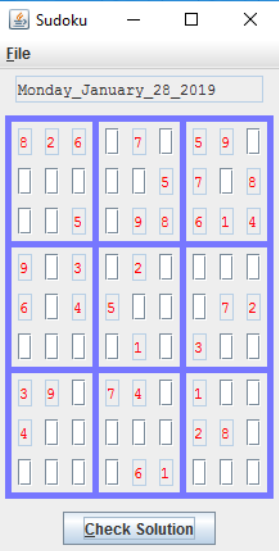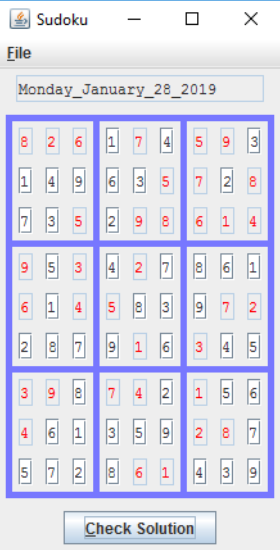 |
| Site Map |
Steve's SudokuFree Sudoku Puzzles
The free
Additionally, a program A Sample from the Program
Here is an emply and filled out sample puzzle generated by the program.
The author would consider that the puzzles generated are of "Easy" to "Moderate" difficulty. Installation Instructions
Download
Problems with the ProgramIf you run into any problems with the program, or if you have any comments about it, please e-mail the author at steve@harren.us. Comments on Uniqueness of SolutionThe Sudoku puzzles generated by the program have 35 clues, which the author has found always to generate solvable puzzles. In some instances, though, the solutions will not be unique, as described by the three cases below. Nevertheless, the author has found that this does not detract from the enjoyment of solving the puzzles. Case I - Permutations of Two Numbers.
Fairly often, the program generates puzzles whose solution contains, in the grid,
two numbers, say
+-----+ +-----+ +-----+ +-----+
| | | | | | | |
| 1 | | 2 | | 2 | | 1 |
| | | | | | | |
+-----+ +-----+ /__\ +-----+ +-----+
\ /
+-----+ +-----+ +-----+ +-----+
| | | | | | | |
| 2 | | 1 | | 1 | | 2 |
| | | | | | | |
+-----+ +-----+ +-----+ +-----+
Case II - Permutations of Three Numbers.
Rarely, the program will generate a puzzle whose solution contains, in the grid, two rows of
three numbers, say
x-----+-----+-----x x-----+-----+-----x
x | | x x | | x
x 1 | 2 | 3 x x 3 | 1 | 2 x
x | | x x | | x
x-----+-----+-----x /__\ x-----+-----+-----x
\ /
x-----+-----+-----x x-----+-----+-----x
x | | x x | | x
x 3 | 1 | 2 x x 1 | 2 | 3 x
x | | x x | | x
x-----+-----+-----x x-----+-----+-----x
Note that a similar situation may exist on a columnwise basis. Case III - Three or More Valid Solutions. When guessing is required to solve the puzzle generated, a valid solution can always be obtained, but in this case, sometimes three (or more) valid solutions can be identified. The author must admit that the mathematics of uniqueness of Sudoku solutions is highly complicated, an he is by no means an expert on the subject. | |||||
Math Rocks!

